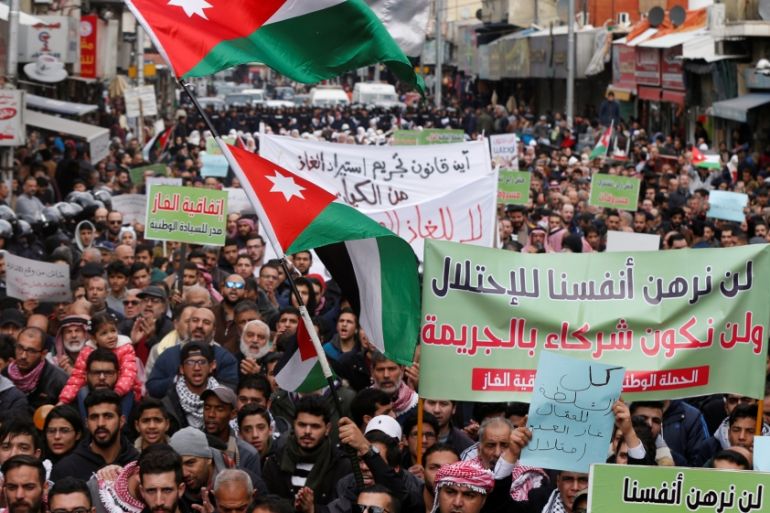Jordan Parliament passes draft law to ban gas imports from Israel
After being passed by Parliament, motion to halt Israeli gas imports will be referred to cabinet to be made law.

The Parliament of Jordan has approved a draft law to ban imports of Israeli gas just days after they started under a multibillion-dollar deal struck in 2016 that is opposed by much of the population.
The motion was unanimously passed on Sunday by Jordan’s 130 legislators and will be referred to the cabinet to be made law, although legal hurdles may prevent it from coming into force.
Keep reading
list of 4 itemsBoeing hit with 32 whistleblower claims, as dead worker’s case reviewed
US imposes new sanctions on Iran after attack on Israel
A flash flood and a quiet sale highlight India’s Sikkim’s hydro problems
The government previously said it was a deal between companies rather than a political matter.
The $10bn supply deal was originally struck between Jordan’s state-owned utility and a US-Israeli consortium led by Texas-based Noble Energy to provide gas to the country’s power plants for electricity generation.
It was not referred to Parliament for approval.
Although United States ally Jordan has a peace treaty with Israel, the deal – which supplies Jordan for 15 years – has faced much popular opposition, with legislators arguing it makes the kingdom dependent on its neighbour for energy.
Many Jordanians are also descendants of Palestinians who moved to the country after the creation of Israel in 1948, and view Israel as an erstwhile enemy that expelled their ancestors from their homes.
A source in the Israeli energy industry, speaking on condition of anonymity, said: “The gas agreement between Jordanian National Electric Power Company and American-based Noble Energy is being implemented from early January 2020, and no change is expected in that regard.”
‘Gas of the enemy’
On Friday, hundreds of Jordanians holding national flags and chanting slogans demonstrated in downtown Amman, calling on the government to cancel the agreement.
The Jordanian government said after the deal was signed in 2016 that securing stable energy prices for the next decade could achieve annual savings of at least $500m and help reduce a chronic budget deficit.
But the import of Israeli gas has become a major focus in Jordan and sparked protests and calls for both the deal and the peace treaty to be scrapped.
“The gas of the enemy is an occupation. Down with the gas deal,” placards carried by protesters said.
“We are here protesting against the gas deal which has been signed in 2016 without the knowledge of the parliament, and we want to send a message to the prime minister that it is enough with the humiliation and shame,” protester Nadia al-Awad said.
“How can we purchase our own [Palestinian] gas from them [Israelis] and pay with our own money? We send this message to them and we say enough with the humiliation, enough shame, enough selling our homelands.”
Public opinion across Jordan has remained against the normalisation of ties with Israel, and on the government level, these relations have become under increasing strain since the gas deal was struck since Donald Trump replaced Barack Obama as US president.
Jordan and Egypt are the only two Arab countries that have a peace treaty with Israel. Last year, both Jordan and Israel marked the 25th anniversary of their landmark peace agreement with cool relations.
Jordan’s King Abdullah fears Israel’s rejection of a Palestinian state in the occupied West Bank could lead to renewed violence and see a new generation of Palestinians relocating to Jordan.